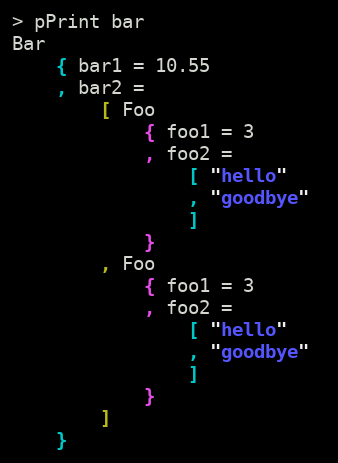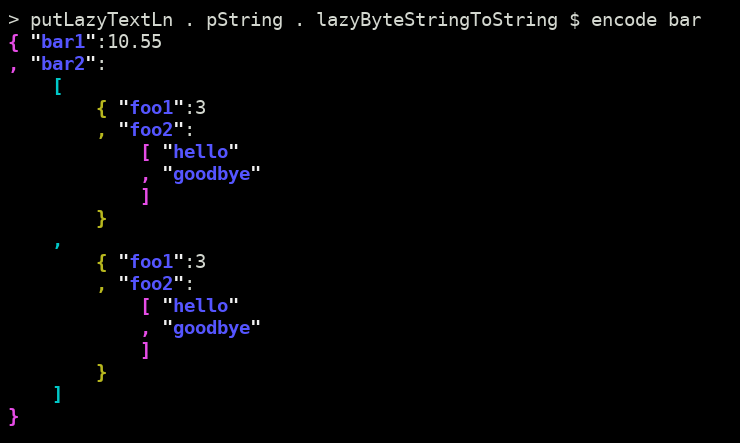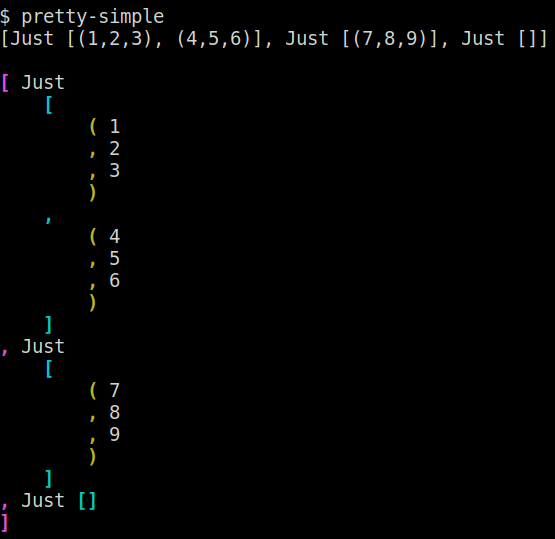pretty-simple
pretty printer for data types with a 'Show' instance.
https://github.com/cdepillabout/pretty-simple
| Version on this page: | 4.1.2.0 |
| LTS Haskell 23.27: | 4.1.3.0 |
| Stackage Nightly 2025-07-11: | 4.1.3.0 |
| Latest on Hackage: | 4.1.3.0 |
pretty-simple-4.1.2.0@sha256:1c0a96e4205010d704c52883c53c98258c588ce7196763b408949d9db712ba14,4113Module documentation for 4.1.2.0
Text.Pretty.Simple
pretty-simple is a pretty printer for Haskell data types that have a Show
instance.
For example, imagine the following Haskell data types and values:
data Foo = Foo { foo1 :: Integer , foo2 :: [String] } deriving Show
foo :: Foo
foo = Foo 3 ["hello", "goodbye"]
data Bar = Bar { bar1 :: Double , bar2 :: [Foo] } deriving Show
bar :: Bar
bar = Bar 10.55 [foo, foo]
If you run this in ghci and type print bar, you’ll get output like this:
> print bar
Bar {bar1 = 10.55, bar2 = [Foo {foo1 = 3, foo2 = ["hello","goodbye"]},Foo {foo1 = 3, foo2 = ["hello","goodbye"]}]}
This is pretty hard to read. Imagine if there were more fields or it were even more deeply nested. It would be even more difficult to read.
pretty-simple can be used to print bar in an easy-to-read format:

There’s a web app compiled with
GHCJS where you can play around with pretty-simple running in your browser.
Usage
pretty-simple can be easily used from ghci when debugging.
When using stack to run ghci, just append the --package flag to
the command line to load pretty-simple:
$ stack ghci --package pretty-simple
Or, with cabal:
$ cabal repl --build-depends pretty-simple
Once you get a prompt in ghci, you can use import to get pretty-simple’s
pPrint
function in scope.
> import Text.Pretty.Simple (pPrint)
You can test out pPrint with simple data types like Maybe or tuples.
> pPrint $ Just ("hello", "goodbye")
Just
( "hello"
, "goodbye"
)
Features
- Easy-to-read
- Complex data types are simple to understand.
- Color
- Prints in color using ANSI escape codes.
- It is possible to print without color by using the
pPrintNoColorfunction.
- Rainbow Parentheses
- Easy to understand deeply nested data types.
- Configurable
- Indentation, compactness, colors and more are configurable with the
pPrintOptfunction.
- Indentation, compactness, colors and more are configurable with the
- Fast
- No problem pretty-printing data types thousands of lines long.
- Works with any data type with a
Showinstance- Some common Haskell data types have a
Showinstance that produces non-valid Haskell code.pretty-simplewill pretty-print even these data types.
- Some common Haskell data types have a
Why not (some other package)?
Other pretty-printing packages have some combination of these defects:
- No options for printing in color.
- No options for changing the amount of indentation
- Requires every data type to be an instance of some special typeclass (instead
of just
Show). - Requires all
Showinstances to output valid Haskell code.
Other Uses
Pretty-print all GHCi output
The pPrint function can be used as the default output function in GHCi.
All you need to do is run GHCi with a command like one of these:
$ stack ghci --ghci-options "-interactive-print=Text.Pretty.Simple.pPrint" --package pretty-simple
$ cabal repl --repl-options "-interactive-print=Text.Pretty.Simple.pPrint" --build-depends pretty-simple
Now, whenever you make GHCi evaluate an expression, GHCi will pretty-print the
result using pPrint! See
here
for more info on this neat feature in GHCi.
Pretty-printing JSON
pretty-simple can be used to pretty-print any String that is similar to
Haskell data types. The only requirement is that the String must correctly
use brackets, parenthese, and braces to indicate nesting.
For example, the
pString
function can be used to pretty-print JSON.
Recall our example from before.
data Foo = Foo { foo1 :: Integer , foo2 :: [String] } deriving Show
foo :: Foo
foo = Foo 3 ["hello", "goodbye"]
data Bar = Bar { bar1 :: Double , bar2 :: [Foo] } deriving Show
bar :: Bar
bar = Bar 10.55 [foo, foo]
You can use aeson to turn these
data types into JSON. First, you must derive
ToJSON
instances for the data types. It is easiest to do this with Template Haskell:
{-# LANGUAGE TemplateHaskell #-}
$(deriveJSON defaultOptions ''Foo)
$(deriveJSON defaultOptions ''Bar)
If you run this in ghci and type encode bar, you’ll get output like this:
> import Data.Aeson (encode)
> putLazyByteStringLn $ encode bar
{"bar1":10.55,"bar2":[{"foo1":3,"foo2":["hello","goodbye"]},{"foo1":3,"foo2":["hello","goodbye"]}]}
Just like Haskell’s normal print output, this is pretty hard to read.
pretty-simple can be used to pretty-print the JSON-encoded bar in an
easy-to-read format:

(You can find the lazyByteStringToString, putLazyByteStringLn,
and putLazyTextLn in the ExampleJSON.hs
file.)
Pretty-printing from the command line
pretty-simple includes a command line executable that can be used to
pretty-print anything passed in on stdin.
It can be installed to ~/.local/bin/ with the following command.
$ stack install pretty-simple
When run on the command line, you can paste in the Haskell datatype you want to be formatted, then hit Ctrl-D:

This is very useful if you accidentally print out a Haskell data type with
print instead of pPrint.
Contributions
Feel free to open an issue or PR for any bugs/problems/suggestions/improvements.
Maintainers
Changes
4.1.2.0
- Fix a problem with the
pHPrintfunction incorrectly outputting a trailing newline to stdout, instead of the handle you pass it. #118 - Add a web app where you
can play around with
pretty-simplein your browser. #116. This took a lot of hard work by @georgefst!
4.1.1.0
- Make the pretty-printed output with
outputOptionsCompactenabled a little more compact. #110. Thanks @juhp! - Add a
--compact/-Cflag to thepretty-simpleexecutable that enablesoutputOptionsCompact. #111. Thanks again @juhp! - Add
pTraceWithandpTraceShowWithtoDebug.Pretty.Simple. #104. Thanks @LeviButcher!
4.1.0.0
- Fix a regression which arose in 4.0, whereby excess spaces would be inserted for unusual strings like dates and IP addresses. #105
- Attach warnings to debugging functions, so that they’re easy to find and remove. #103
- Some minor improvements to the CLI tool:
4.0.0.0
- Expand
OutputOptions: - Significant internal rewrite of printing code, to make use of the prettyprinter
library. The internal function
layoutStringcan be used to integrate with otherprettyprinterbackends, such as prettyprinter-lucid for HTML output. #67
3.3.0.0
- Add an output option to print escaped and non-printable characters literally when outputting strings. #68 and #69 Thanks Joe Hermaszewski (@expipiplus1)!
3.2.3.0
- Fix a bug that messes up printing identifiers with
'in the name. Now identifiers likedata Don't = Don'tshow up properly. #65 Thanks George Thomas (@georgefst)!
3.2.2.0
3.2.1.0
3.2.0.0
3.1.1.0
- Added a
pPrintStringfunction for pretty-printing aStringthat is the output ofshow. Implemented in #54. Thanks sureyeaah! - Fix build on GHC-7.10.3. #55. Thanks sjakobi.
3.1.0.0
- Numbers are now highlighted in green by default. Implemented in #51. Thanks lawrencebell!
3.0.0.0
- pretty-simple now escapes non-printable characters by default. A field
called
outputOptionsEscapeNonPrintablehas been added toOutputOptionsto control this behavior. Implemented in #44. Thanks dminuoso! - pretty-simple now checks the output
Handleto determine whether to print in color when using functions likepPrint. This makes it so that you can redirect output to a file on disk and still be able to read the output frompPrint! Implemented in #47. Thanks metiulekm! - Add functions like
pHPrintfor specifying theHandleto output to. Added in #47.
2.2.0.1
- Fixed a bug where the parser failed to parse escaped quotation marks in string literals. Thanks Andreas!
2.2.0.0
- Fixed a bug with a missing space after strings. Thanks again Andrew!
- Add a command line flag
--colorto be able to set whether to use colors for a dark background (--color dark-bg), a light background (--color light-bg), or no color (--color no-color). This is from great work by Andrew! - Made parsing/printing lazy - pretty-printing will now output strings continuously as they’re read, handling potentially infinite input.
2.1.0.1
2.1.0.0
2.0.2.1
-
Add a small command-line program that will pretty print anything from stdin called
pretty-print. It can be installed to~/.local/binif you enable the flagbuildexelike so:$ stack install pretty-simple-2.0.2.1 --flag pretty-simple:buildexeWhen you run it, you can paste something you want formatted on stdin, then press Ctrl-D. It will print the formatted version on stdout:
$ pretty-simple [(Just 3, Just 4)] ^D [ ( Just 3 , Just 4 ) ]
2.0.2.0
- Fix a problem with the pTraceShow functions not working correctly.
2.0.1.0
- Added the
Debug.Pretty.Simplethat exports functions that work likeDebug.Trace.


